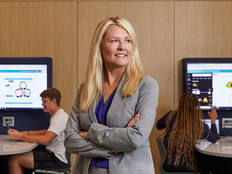Millennials' Education Relies On Technology
What makes the Millennials, born between 1982 and 2000, different? Well, for one thing, they’ve never known a world without technology, so their attitudes toward education are unique.
Born between 1982 and 2000, the “Millennial Generation” is the largest generation this country has ever known, representing approximately 36 percent of the total United States population, according to the 2002 census.
This translates into nearly 100 million youths, up to 24 years old, who have more than $170 billion worth of influence over the economy. In fact, 20 percent of teens own stock, according to Teen Research Unlimited, a Northbrook, Ill.-based research firm.
This generation has never known a world without technology. That makes its attitudes toward education unique in the history of civilization. And, for the most part, members of this generation have enjoyed childhoods of sustained peace and economic expansion—another unique situation. Given that, it’s not surprising that these young people are confident and optimistic about their future. Students today are big thinkers. They respect their parents and are patriotic; they are activists and want to use technology to engage with the world around them.
According to William Strauss and Neil Howe, authors of Milliennials Rising: The Next Great Generation, they embrace values resembling those of what has been called the Greatest Generation—people identified primarily with World War II (preceding the baby boomers).
The WWII/GI Generation, or Greatest Generation, was coming of age during the Roaring ‘20s, a decade often associated with the boom of the 1990s. During the twenties, America wasn’t paying attention to the thoughtful youth who were destined to make a great mark on the world when America faced back-to-back crises. At the time, that decade seemed to embody a raucous, carefree attitude. It’s easy to draw comparisons between the Greatest Generation and the Millennials.
There clearly are differences as well. A major one is that Millennials are armed with technology that no other generation has possessed. This could produce a powerful group of individuals with the capacity to significantly change the world. Despite the technology differences, the generations have a lot in common. For instance, national surveys show that this generation, like the Greatest Generation, is optimistic about the future and dedicated to civic leadership and progress.
In addition, Millennials embody the values that are vitally important in today’s business world: team project work and group decision-making.
Why Millennials Matter
Although private industry has long used surveys and demographics to make decisions about products and services, never before has anyone considered the values and priorities of students as a way of thinking about our educational system.
NetDay recently hosted Speak Up Day, in which 210,000 K-12 students from 1,535 schools in all states, the District of Columbia and many Department of Defense Dependents’ Overseas Schools shared their opinions, ideas and thoughts about how technology should be used in schools.
Technology is key to this generation. Nedra Hill, a first-grade teacher at LaHontan Elementary School in Fallon, Nev., says her students arrive in class with technology know-how. “We used to spend some time teaching basic technology skills to the first-graders,” she explains. “Now, when the kids arrive, we don’t spend any time teaching students how to use the computer. They come to class knowing how to use technology as a tool for learning.”
Education officials often discuss education and technology as if they were separate subjects; Millennials don’t consider them that way.
“Today’s students are more than just tech-savvy,” says Julie Evans, NetDay CEO. “They rely on technology as an essential component to every aspect of their lives. They aren’t just using technology in different ways, they are approaching their life and daily activities differently because of technology.”
In grades seven through 12, 97 percent of the students said that technology was very important to their education, and 83 percent said that losing Internet access would have a negative impact on their education.
The Internet has dramatically changed how students look for and assemble information for schoolwork. Sixty-seven percent of students in grades seven through 12 reported on the NetDay survey that when they are asked to write a report on a new topic, they use a technology-based solution by doing an Internet search or visiting a bookmarked site.
The challenge to education leaders is to modernize methods and create an educational experience that enables students to apply what they have learned to the world around them.
The National Education Technology Plan, which is due to be released in 2004 by the U.S. Department of Education, has taken into consideration the unique characterisitics of the millenial generation. The plan will share strategies that will help educational leaders identify appropriate roles for technology in education, thereby improving student achievement.
How would students like to see technology used in their schools to improve learning?
• K-12 students believe the highest spending priority should be given to additional computers and better software.
• Students in grades four through 12 want new schools designed with fast wireless access, new wireless computers, and computer labs that are open after school and on weekends.
• Students in grades four through 12 believe that if schools had a lot of technology available, learning would be more fun, students would learn more, projects would be done better, and students would get higher grades in class and on tests.
Source: NetDay’s Speak Up Day 2003 survey results of 210,000 K-12 students in 1,535 schools
Since the 17th century, a great “hero” generation has come around every fourth generation.
Generation / Birth Year / Famous Man / Famous Woman
Glorious / 1648-1673 / Cotton Mather / Hannah Dustin
Republican / 1742-1766 / Thomas Jefferson / Abigail Adams
Progressive / 1843-1859 / Woodrow Wilson / Mary Cassatt
GI (Greatest Generation) / 1901-1924 / John F. Kennedy / Clare Booth Luce
Millennial / 1982-2000 / To be determined / To be determined
Source: Millennials Rising: The Next Great Generation, Neil Howe and William Strauss, 2000
Millennial Values
96% get along with their parents
80% think it’s cool to be smart
78% believe religion is important
75% share their parents’ values
60% engage in community service
Source: Millennials Rising: The Next Great Generation, Neil Howe and William Strauss, 2000







